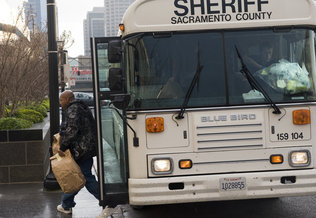The fury unleashed in Sacramento over the early releases of a couple hundred inmates has set the stage for a more massive but less detectable state prisoner population shift about to unfold.

A shift in state prisoners will follow the early release of some low-risk offenders in Sacramento. This former inmate was among those released early from the Rio Cosumnes Correctional Facility on Feb. 2. (Photo: Lezlie Sterling)
By the end of the year, another 6,300 offenders from Modoc to San Diego who otherwise would have been behind prison bars will instead be on the streets - and the debate already is raging on the public safety fallout.
Gov. Arnold Schwarzenegger's administration, which pushed for the bill that led to the prison population reduction to save money in a cash-strapped state, contends the legislation will make the state safer. More parole supervision time will be reserved for the truly dangerous, a prison agency spokesman said, and more inmates will complete more rehabilitation programs to smooth their transition into free society - even if it comes six weeks earlier than their sentences had prescribed.
"What you really have is a changing California parole structure that is really unprecedented," the corrections department's Oscar Hidalgo said. "It allows our agents to focus on the highest-risk parolees, which increases public safety. As far as the earned credits, we're asking inmates to complete programs that have proven helpful to success on the outside, such as getting a GED or learning a trade."
Law enforcement and victims' rights groups counter that the bill that enabled the upcoming offender population shift from inside to out is a high-risk move. They say that police budgets slashed as a result of depressed local economies will mean fewer street cops available to cope with increased numbers of so-called lesser-risk offenders such as car thieves, drunken drivers and spousal abusers.
"The legislation was based on a lie that the prisons are filled with low-level offenders who pose no real threat to public safety, and that is absolutely not true," said Ray McNally, a political consultant whose client list includes the California Correctional Peace Officers Association and Crime Victims United of California, which is partially funded by the guards' union. "When you release dangerous people, other people get hurt."
A trailer bill to last year's state budget authorized the prison population cut. Most of the reduction is expected to come through parole policy changes in which lower-risk offenders will no longer be subject to revocations that return them to prison. The legislation, Senate Bill X3 18, also granted six-week time credits to prisoners who complete education and other programs.
The bill also contained the provisions that led about 20 counties, including Sacramento, to grant early releases to an estimated 1,000 inmates from their local jail facilities.
In Sacramento, one inmate released early was arrested on suspicion of trying to rape a woman staff member at the Loaves & Fishes compound for the homeless. It prompted the Sacramento County Deputy Sheriffs Association to file a lawsuit to block the releases.
Superior Court Judge Loren E. McMaster on Thursday issued a temporary restraining order on the deputies' behalf. He also ruled that as of Jan. 25, last year's bill inexplicably eliminated county inmates' good-behavior credits.
The decision caused confusion later in the week in the local courts, with some lawyers postponing sentencing on their clients until the lawsuit plays out more fully. A hearing on a preliminary injunction is scheduled for March 3.
"I have a county jail sentencing (on a client) coming up, and I continued it until I think the waters have cleared and we know what's going on," said veteran Sacramento criminal defense lawyer Russell W. Miller. "There's no way you can advise your client. It's part of our ethical obligation to make sure our clients are fully and properly informed."
Assemblyman Alberto Torrico, D-Newark, closely involved in shaping the final version of the prison legislation, said in a declaration in support of the deputies' suit that the bill was never intended to apply to county jail inmates.
Torrico, a candidate for state attorney general, is trying to craft a new, emergency bill to fix what in effect was a legislative blunder. The assemblyman said through a spokesman Friday he did not know how the provisions that triggered the early releases made it into the bill's final language.
Tim Yaryan, a lobbyist for the Los Angeles police and deputy sheriffs' unions, said the mistaken inclusion of the jail provisions illustrates the shortcomings of the state's legislative process, one in which bills such as SB X3 18 can become law without being vetted in policy committees.
"There was no review," Yaryan said. "If you go through the committee hearings, you have people analyzing it and looking at it, and this would have been picked up. I have no doubt about it."
If it took a suit by the Sacramento deputies' union to bring the problem to light, the association's president, Kevin Mickelson, was happy to oblige. But he said he fears the impact of thousands more offenders hitting the streets.
"It's only the tip of the iceberg," Mickelson said of the 200 inmates in Sacramento who got out of jail early .
Prison reform advocates such as Jim Lindburg, a lobbyist for the Friends Committee on Legislation, hope that the state's first significant corrections-policy change in decades ushers in a whole new mind-set on crime.
"There's really nothing scientific or magical about the length of prison sentences," Lindburg said. "Those are political calculations made in a political environment. It seems preposterous to me to suggest that letting people out a little bit early is going to have any kind of (negative) impact on crime rates. I think we just need to change the way we think about public safety."











